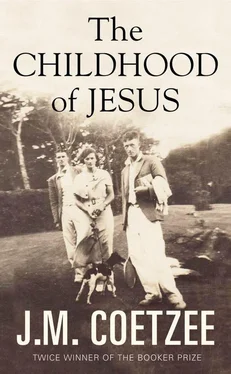‘I don’t like girls.’
‘That’s what all boys say. Then suddenly one day they fall in love and get married.’
‘I’m not going to get married.’
‘That’s what all boys say.’
‘You’re not married.’
‘Yes, but I’m a special case. I’m too old to get married.’
‘You can marry Inés.’
‘I have a special relationship with your mother, David, which you are too young to understand. I am not going to say any more about it except that it is not a marrying relationship.’
‘Why not?’
‘Because inside each of us there is a voice, sometimes called the voice of the heart, that tells us what kind of feeling we have for a person. And the kind of feeling I have for Inés is more like goodwill than love, the marrying kind of love.’
‘Is señor Daga going to marry her?’
‘Is that what is worrying you? No, I doubt that señor Daga wants to marry your mother. Señor Daga isn’t the marrying kind. Besides, he has a perfectly satisfactory girlfriend of his own.’
‘Señor Daga says he and Frannie make fireworks. He says they make fireworks under the moon. He says I can come and watch. Can I?’
‘No, you can’t. When señor Daga says fireworks he doesn’t mean real fireworks.’
‘He does! He has a whole drawer full of fireworks. He says that Inés has perfect breasts. He says they are the most perfect breasts in the world. He says he is going to marry her for her breasts and they are going to make babies.’
‘He says that, does he! Well, Inés will have thoughts of her own on the subject.’
‘Why don’t you want señor Daga to marry Inés?’
‘Because if your mother really wanted to get married she could find a better husband.’
‘Who?’
‘Who? I don’t know. I don’t know all the men your mother knows. She must know lots of men at La Residencia.’
‘She doesn’t like the men at La Residencia. She says they are too old. What are breasts for?’
‘A woman has breasts so that she can give milk to her baby.’
‘Is there milk inside Inés’s breasts? Will I have milk in my breasts when I grow up?’
‘No. You will grow up to be a man, and men don’t have breasts, proper breasts. Only women give milk out of their breasts. Men’s breasts are dry.’
‘I want to have milk too! Why can’t I have milk?’
‘I told you: men don’t make milk.’
‘What do men make?’
‘Men make blood. If a man wants to give something out of his body, he gives blood. He goes to the hospital and gives his blood to sick people and people who have had accidents.’
‘To make them better?’
‘To make them better.’
‘I am going to give blood. Can I give blood soon?’
‘No. You will have to wait until you are older, until you have more blood in your body. Now there is something else I have been meaning to ask. Does it make things difficult for you at school that you don’t have a normal father, like other children, that you have only me?’
‘No.’
‘Are you sure? Because señora Otxoa, the lady at the school, told us you might be worried about not having a proper father.’
‘I’m not worried. I’m not worried about anything.’
‘I’m glad to hear that. Because, you know, fathers aren’t very important, compared with mothers. A mother brings you out of her body into the world. She gives you milk, as I mentioned. She holds you in her arms and protects you. Whereas a father can sometimes be a bit of a wanderer, like Don Quixote, not always there when you need him. He helps to make you, right at the beginning, but then he moves on. By the time you come into the world he may have vanished over the horizon in search of new adventures. That’s why we have godfathers, trusty, staid old godfathers, and uncles. So that while the father is away there is someone to hold his place, someone to fall back on.’
‘Are you my godfather or my uncle?’
‘Both. You can think of me as whichever you like.’
‘Who is my real father? What is his name?’
‘I don’t know. Dios sabe . It was probably in the letter you were carrying, but the letter is lost, eaten by the fishes, and shedding tears won’t bring it back. As I said, it often happens that we don’t know who the father is. Even the mother doesn’t always know for sure. Now: are you ready to see señor León? Ready to show him how clever you are?’
For an hour they wait patiently outside the school office, until the last bell has rung and the last classroom has emptied. Then señor León passes, satchel in hand, on his way home. He is clearly not pleased to see them.
‘Just five minutes of your time, señor León,’ he pleads. ‘We want to show you how much progress David has made with his reading. Please. David, show señor León how you read.’
Señor León gestures them into his classroom. David opens Don Quixote . ‘Somewhere in La Mancha, in a place whose name I do not recall, lived a gentleman who owned a scrawny nag —’
Señor León cuts him off peremptorily. ‘I am not prepared to listen to a recitation.’ He strides across the room, flings open a cupboard, returns with a book, and opens it before the child. ‘Read to me.’
‘Read where?’
‘Read the beginning.’
‘Juan and María go to the sea. Today Juan and María are going to the sea. Father tells them their friends Pablo and Ramona may come along. Juan and María are excited. Mother makes sandwiches for the trip. Juan —’
‘Stop!’ says señor León. ‘How did you learn to read in two weeks?’
‘He has spent a lot of time on Don Quixote ,’ he, Simón, intervenes.
‘Let the boy speak for himself,’ says señor León. ‘If you could not read two weeks ago, how is it that you can read today?’
The boy shrugs his shoulders. ‘It’s easy.’
‘Very well, if reading is so easy, tell me what you have been reading. Tell me a story from Don Quixote .’
‘He falls into a hole in the ground and no one knows where he is.’
‘Yes?’
‘Then he escapes. With a rope.’
‘And what else?’
‘They lock him up in a cage and he makes poo in his pants.’
‘And why do they do that — lock him up?’
‘Because they won’t believe he is Don Quixote.’
‘No. They do it because there is no such person as Don Quixote. Because Don Quixote is a made-up name. They want to take him home so that he can recover his senses.’
The boy casts him, Simón, a dubious glance.
‘David has his own reading of the book,’ he says to señor León. ‘He has a lively imagination.’
Señor León does not deign to respond. ‘Juan and Pablo go fishing,’ he says. ‘Juan catches five fish. Write that on the blackboard: five. Pablo catches three fish. Write that underneath the five: three. How many fish do they catch together, Juan and Pablo?’
The boy stands before the blackboard, his eyes screwed shut, as if listening for a far-off word to be spoken. The chalk does not move.
‘Count. Count one-two-three-four-five. Now count three more. How many does that give you?’
The boy shakes his head. ‘I can’t see them,’ he says in a tiny voice.
‘You can’t see what? You don’t need to see fish, you just need to see the numbers. Look at the numbers. Five and then three more. How many is that?’
‘This time. . this time. .’ says the boy in the same tiny, lifeless voice, ‘it is. . eight.’
‘Good. Make a line below the three, and write eight. So you were pretending all the time you said you could not count. Now show us how you write. Write, Conviene que yo diga la verdad , I must tell the truth. Write it. Con-viene .’
Читать дальше












